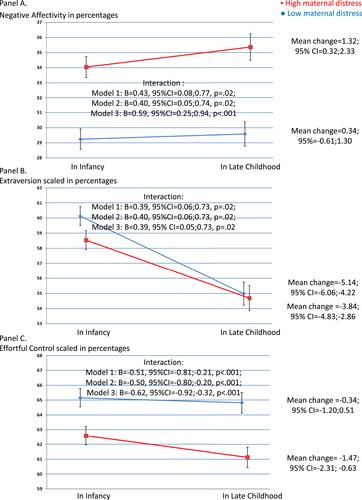Maternal psychological distress during pregnancy is associated with infant temperament. Whether associations persist into late childhood, whether maternal distress is associated with temperament change from infancy to late childhood, whether associations are independent of maternal concurrent distress, and whether maternal distress has sensitive exposure periods on child temperament remain unclear.
Our study includes mother-child dyads from Finnish, prospective Prediction and Prevention of Preeclampsia and Intrauterine Growth Restriction study. The mothers completed the Center for Epidemiologic Studies Depression Scale, State Anxiety Inventory and Perceived Stress Scale: biweekly up to 14 times during pregnancy; once in infancy (at child age 4–12 months); and once in late childhood (at child age 7–11 years). They also completed the Infant Behavior Questionnaire Revised at the infancy (n = 2538) and Temperament in Middle Childhood Questionnaire at the late childhood (n = 2004; 1693 children had data at both follow-ups) follow-up on child negative affectivity, extraversion and effortful control. We examined the associations of maternal distress with child temperament with linear regression, linear mixed and Bayesian relevant lifecourse exposure models.
Maternal distress during pregnancy was associated with higher negative affectivity and lower effortful control in children in infancy and late childhood. Maternal distress during pregnancy was also associated with increases in negative affectivity, decreases in effortful Control, and smaller decreases in extraversion from infancy to late childhood. The associations with late childhood temperament and temperament change were independent of maternal concurrent distress. Late childhood was a sensitive period for lifetime-to-date effects of maternal distress on late childhood negative affectivity and effortful control. Distress during pregnancy and infancy had smaller contributions.
Maternal psychological distress during pregnancy is associated with individual differences and change in child temperament from infancy to late childhood. However, distress during pregnancy has a smaller effect on late childhood temperament than maternal concurrent distress.



